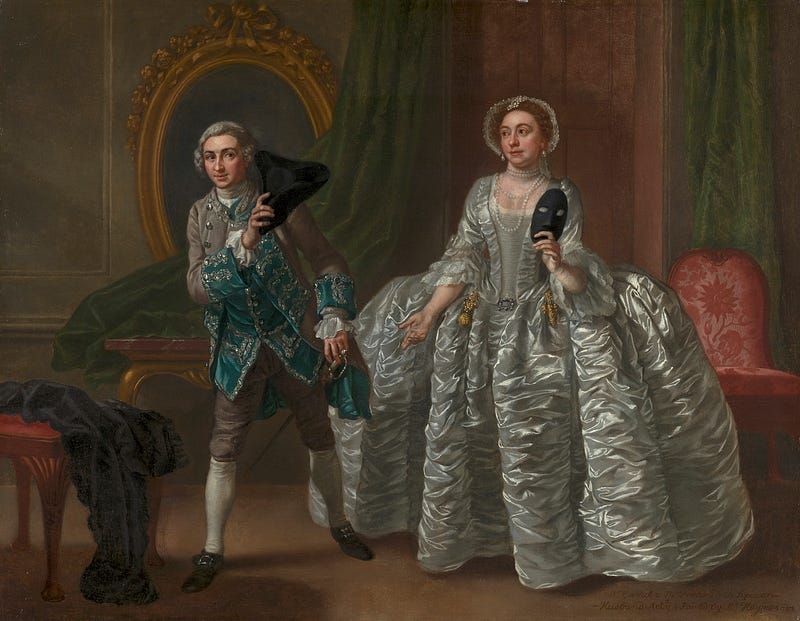Rethinking "Be Yourself": The Masks We Wear in Love and Life
Written on
Chapter 1: The Dilemma of Authenticity
The phrase “Be Yourself” often falls short as dating advice. In fact, it can sometimes be more beneficial to adopt a persona that aligns with the qualities you aspire to embody.

In Max Beerbohm’s “The Happy Hypocrite,” the notorious Lord George Hell wreaks havoc across Victorian London with his immoral lifestyle. Described as a blend of Caligula and Sir John Falstaff, he engages in deceitful and indulgent behaviors, even audaciously gazing at women’s ankles. In contemporary terms, we might label George as a quintessential cad.
One fateful evening at the opera, he becomes enchanted by an actress named Jenny Mere. Struck by love, he feels compelled to marry her. However, Jenny is no shallow gold digger; she seeks a man of virtue. She candidly tells George that his face resembles a “tarnished” mirror, indicating her unwillingness to wed someone whose appearance reflects their character.
George is devastated, contemplating drowning in despair without her affection. He decides to don a mask—not one that showcases a façade of happiness, but a mask of virtue to win her love. When Jenny sees him adorned with this new persona, she is captivated and accepts his proposal.
Yet, George faces a challenge: to convince Jenny of his virtuous nature, he must genuinely embody it. He begins aiding the less fortunate, renounces his vices, and transforms into a man of honor. Their story culminates in a fairytale ending—until his former lover, La Gambogi, reemerges and reveals his deception by tearing off his mask.

Surprisingly, when George’s mask is removed, he finds that his wicked demeanor has evolved into one of virtue. This narrative is echoed in modern tales, such as “As Good As It Gets,” where Melvin, portrayed by Jack Nicholson, falls for Carol, played by Helen Hunt. After numerous unsuccessful attempts to win her over, she demands a sincere compliment. Melvin's heartfelt remark, “You make me want to be a better man,” catalyzes his transformation.
In Western literature, masks often symbolize deception. In Edgar Allan Poe’s “The Masque of the Red Death,” the hedonistic veneer falls away as death approaches. Similarly, Mr. Hyde’s courteous demeanor masks the chaos unleashed by Dr. Jekyll, and the Count of Monte Cristo conceals his identity behind opulent attire and false titles. In these narratives, the unmasking reveals the truth behind the character.
However, not all cultures perceive masks as deceptive. In Japan, individuals are thought to possess both an “omote”—the mask presented to the world—and an “ura”—the true self hidden behind that mask. The omote serves as a necessary societal façade, allowing individuals to embody the virtuous qualities they aspire to attain. Thus, rather than being a tool of deception, wearing a virtuous mask can inspire one to grow into a better version of themselves.
This brings us back to the phrase “be yourself.” A more constructive approach would be to strive to become the person you wish to be. This aligns with the concept of “fake it till you make it,” with the critical distinction being that one should aim to project an honorable character.
The notion of “being yourself” is often oversimplified. While Oscar Wilde’s famous quote, “Be yourself; everyone else is already taken,” is widely accepted, the underlying principle of character development is frequently overlooked. The etymology of “character” traces back to the Greek word “charassein,” which means “to engrave.” Character is not fixed; it is shaped and refined over time, much like the artistry Michelangelo envisioned in the stone.
We all harbor potential within us; strive to reveal that potential rather than being constrained by a flawed self-image.
Chapter 2: Embracing Change in Relationships
In contemporary romance, individualism often reigns supreme. We hesitate to allow love to influence our personal growth, clinging to the belief that we should be accepted as we are. However, the truth is that acceptance should hinge on the person you aspire to be, not merely on your current state.
Research indicates that flexibility—an openness to change—is a vital predictor of relationship longevity. A meta-analysis has shown that individuals resistant to psychological flexibility are more prone to relationship dissatisfaction and are also likely to engage in abusive behaviors. This rigidity can severely hinder one's romantic life.
To cultivate flexibility, consider these strategies:
- Prioritize long-term goals over momentary desires. Seek meaningful connections rather than transient encounters.
- Focus on the present and avoid resurrecting past grievances that have already been addressed.
- Engage in perspective-taking by considering issues from your partner’s viewpoint. Participate in neutral discussions to identify mutual shortcomings.
- Acknowledge your emotions without acting upon them. Recognize feelings of anxiety or jealousy as valid but refrain from impulsive reactions.
- Embrace a growth mindset by viewing setbacks as opportunities for learning and improvement.
- Surround yourself with adaptable individuals who inspire you to evolve.
Ultimately, we are drawn to those who embody the qualities we wish to cultivate in ourselves. While we may initially don masks to attract virtuous partners, the façade will eventually fade. If the mask reflects genuine virtue, it can guide us toward becoming better individuals.
“It is not the strongest of the species that survives, nor the most intelligent, but the one most responsive to change.” — Charles Darwin

Carlyn Beccia is an award-winning author and illustrator of 13 books. For more articles categorized by topic, see my Table of Contents.
Update! I am launching "Conversations with Carlyn" soon to foster open discussions with readers about sex, love, feminism, culture, and the latest science behind our most intimate human interactions.
If you appreciated this article, please consider supporting my research and writing by becoming a paid subscriber. You won’t be charged until our conversation begins.